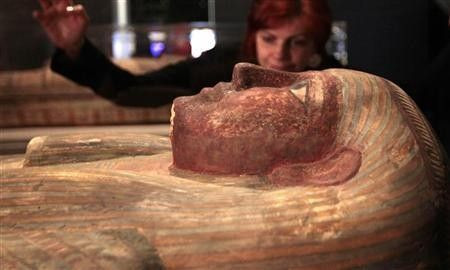Egypt's Mummies Divulge Secrets in Modern Scotland

(Reuters) - Modern technology reveals the secrets kept for thousands of years by Egyptian mummies in a major exhibition at Scotland's National Museum.
Scientists used advanced scanning techniques on the mummified corpses of a young woman and a girl child laid over her feet to reveal jewelry in the binding and also have plans to tap their DNA to discover whether the two are related.
The show, including the embalmed mummies and objects dating back 6,000 years from the collections at the Scottish museum and the National Museum of Antiquities at Leiden in The Netherlands, opened at the weekend and runs through to May 27 when it will go on to Spain.
The exhibition is being staged in a new purpose-built space created during a 47 million pound ($73.64 million) renovation of the Edinburgh museum completed last July.
The vastly expanded space has allowed the museum to display objects not seen by the public for generations. Officials said three-million people have visited the museum since July.
Jim Tate, head of conservation at the museum, said scientists at Liverpool University who scanned the mummified corpses using advanced techniques had identified a gold amulet in the young woman's binding and created an exact copy as a gold-gilded titanium artifact.
Scientists now plan to use nuclear DNA tests to determine if the woman and child are related, Tate said.
The area holding the mummies and a series of coffins has been designed to resemble a tunnel into pyramids and tombs, providing an evocative and somewhat eerie atmosphere.
Museum director Gordon Rintoul said Edinburgh had a major Egyptology collection, with Alexander Henry Rhind, a Scottish traveler in the mid-19th century, one of the first collectors to scientifically record his discoveries.
Hanneke Kik of the Leiden museum said the institution had cooperated with an exhibition on Egyptology with the Museum of Civilization in Canada's Quebec City three years ago. The current joint exhibition in Edinburgh had been two years in the making, and will go from the Scottish capital to six locations in Spain later this year.
© Copyright Thomson Reuters {{Year}}. All rights reserved.





















